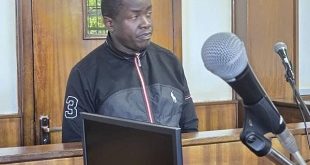
KAMPALA, UGANDA | Patricia Akankwatsa | Denmark joined the EU’s “Partnering for Forests Uganda” program, committing substantial aid to tackle the nation’s critical deforestation crisis, marking a major step for Uganda’s environmental future.
Launched on the International Day of Forests, the partnership aims to reverse Uganda’s dramatic forest loss, a drop from 24% in 1990 to only 11% currently.
H.E. Signe Winding Albjerg, Denmark’s Ambassador to Uganda, shared the compelling story behind Denmark’s involvement, a tale that began with an unconventional diplomatic excursion.
A pivotal 4.5-hour trek through the dense, biodiverse Bwindi Impenetrable Forest, undertaken by the Danish Minister for Global Development and Climate, alongside EU Ambassador Jan Sadek, served as a catalyst for Denmark’s commitment.
“This is of course part of a larger Danish investment in forest globally,” Ambassador Albjerg explained, highlighting Denmark’s 1 billion Danish krone investment in forests worldwide, including the Amazon and Central Africa.
“And the Uganda part came about very much thanks to the EU, mostly so my friend Ambassador Jan who accepted to take a trip with us.”
The trek, far from a casual gorilla-viewing safari as initially perceived by some, provided a stark illustration of Uganda’s unique biodiversity and the urgent need for forest conservation.
Uganda’s forest cover has plummeted from 24% in 1990 to a mere 11% today, a devastating trend with far-reaching consequences, including soil erosion, declining soil fertility, and the loss of irreplaceable biodiversity. This alarming rate of deforestation, among the highest globally, prompted the EU and Denmark to join forces with the Ugandan government to reverse this trend.
H.E. Jan Sadek, EU Ambassador to Uganda, emphasized the global significance of forests, highlighting their crucial role in supporting livelihoods and providing essential resources.
“More than five billion people around the world use forest and non-timber forest products for food, medicine and livelihoods,” he stated.
“Forests and trees are a rich source of nuts, fruits, seeds, roots, tubers, leaves, mushrooms, honey, wild meat and insects, providing essential nutrients to people’s dietary intake.”
The “Partnering for Forests Uganda” program, a Team Europe initiative, aims to address the root causes of deforestation and promote sustainable forestry through a three-pronged approach: strengthening the sustainable supply of legally sourced timber, enhancing wood processing capacity, and improving access to financing for the forestry sector.
Antonio Querido, FAO Country Representative, praised Uganda’s ambitious forest restoration drive while highlighting critical gaps in the nation’s timber value chain during the EU-Uganda Forest Partnership launch.
“Through two decades of collaboration with the EU and other partners, Uganda has successfully established 150,000-200,000 hectares of timber plantations,” Querido revealed. “This demonstrates the remarkable political will to reverse deforestation trends.”
However, he cautioned that planting trees alone won’t solve Uganda’s forestry crisis. “We’ve reached an inflexion point,” he stressed.
“Now we must mobilize unprecedented resources to transform this raw material potential into sustainable economic value – from modernized processing to green job creation.”
“The seedlings we plant today must translate into tomorrow’s climate-smart livelihoods. FAO remains committed to walking this journey with Uganda every step of the way,” he concluded.
The partnership brings together a diverse range of stakeholders, including the Ugandan government, FAO, UNODC, and the Italian Agency for Development, to leverage their expertise and resources.
The program will tackle critical challenges such as illegal logging, inefficient processing technologies, skill gaps in the workforce, and limited access to financing for small and medium- sized enterprises. It will also promote climate-smart agriculture, nature-based enterprises, and reforestation efforts.
“This partnership cements the important role that the European Union plays in Uganda’s development and in uniting European countries in Uganda to the benefit of the Ugandan people,” Ambassador Albjerg affirmed.
The program’s objectives align with Uganda’s ambitious goal of restoring 5 million hectares of forest cover by 2030.
The initiative will also address the impact of deforestation on vulnerable communities, particularly in northern Uganda, which hosts a significant refugee population and faces challenges related to water scarcity and peaceful coexistence.
“Continued pressure on natural resources, especially for us, remains one of the largest challenges for development, not just for biodiversity, but also for economic growth and poverty reduction,” Albjerg stated.
The partnership’s focus on sustainable timber supply is crucial for mitigating deforestation driven by the demand for wood products. The program will support the development of sustainable wood-based value chains and promote responsible forest management practices.
To enhance wood processing capacity, the program will introduce modern technologies, provide training to improve skills and diversify wood products. This will create new economic opportunities and reduce reliance on unsustainable harvesting practices.
Addressing the financial barriers faced by small and medium-sized enterprises in the forestry sector is another key priority. The program will explore innovative financing mechanisms and promote financial literacy to facilitate investments in sustainable forestry.
The partnership also recognizes the importance of law enforcement, accountability, and civic engagement in promoting sustainable forestry. By strengthening governance and empowering local communities, the program aims to create a more resilient and equitable forestry sector.
“Our work here today resonates beyond Uganda,” Ambassador Sadek emphasized.
“As the world pursues the United Nations Sustainable Development Goals, we must remember that preserving our forests and natural resources is foundational to achieving many of these goals.”
The collaborative effort between Denmark, the EU, and the Ugandan government marks a major step towards safeguarding Uganda’s invaluable forests and ensuring a sustainable future for its people.
 The Independent Uganda: You get the Truth we Pay the Price
The Independent Uganda: You get the Truth we Pay the Price



